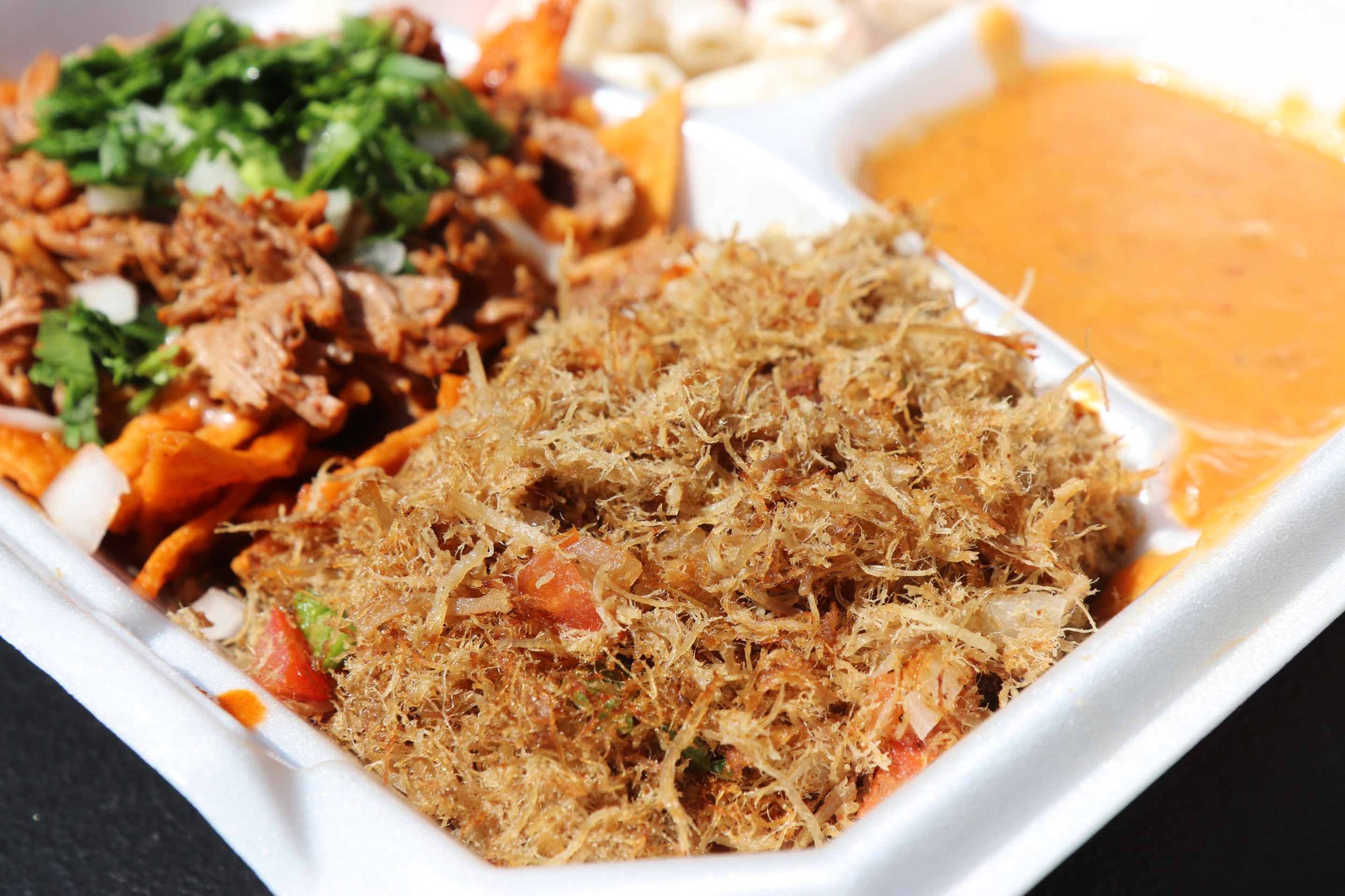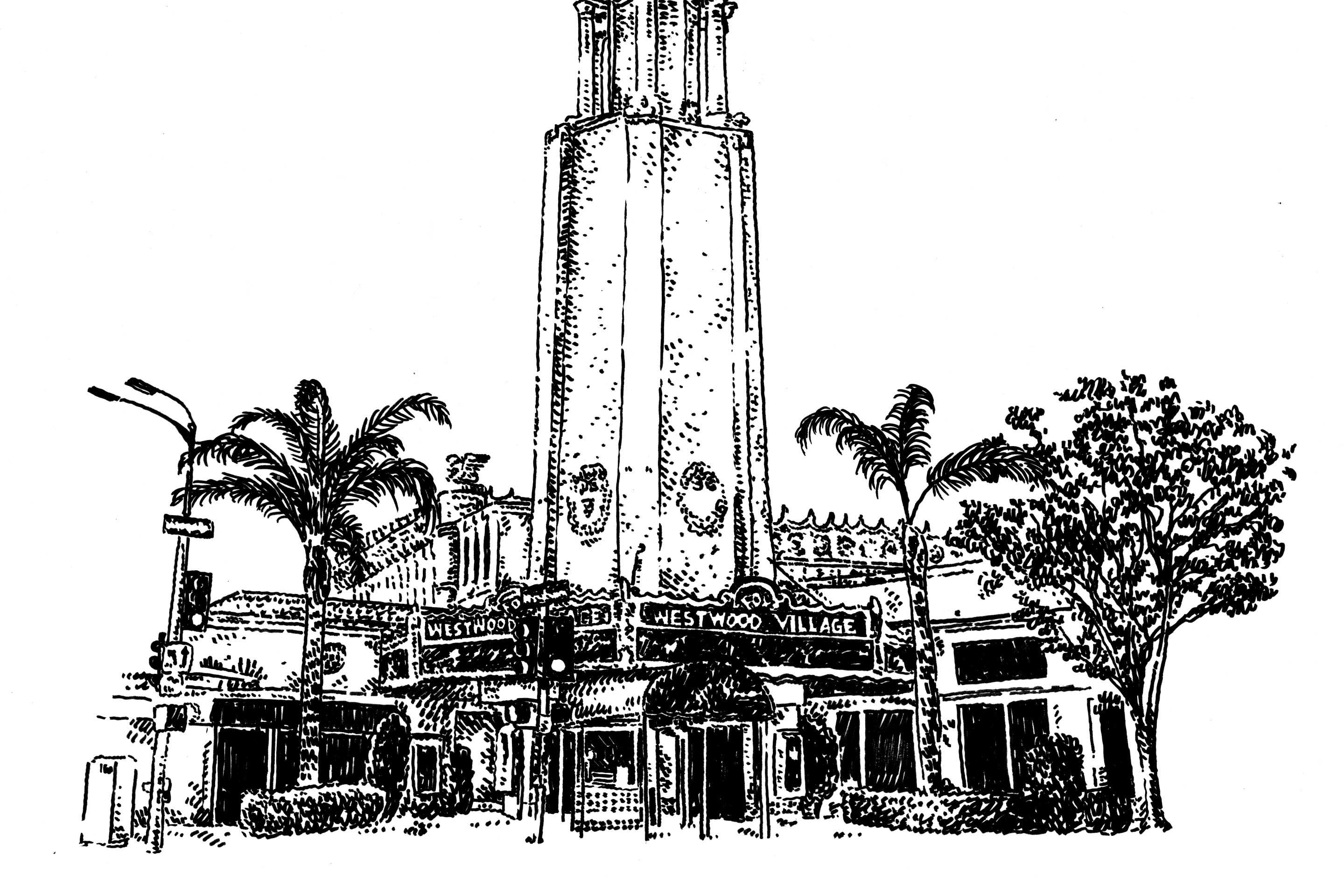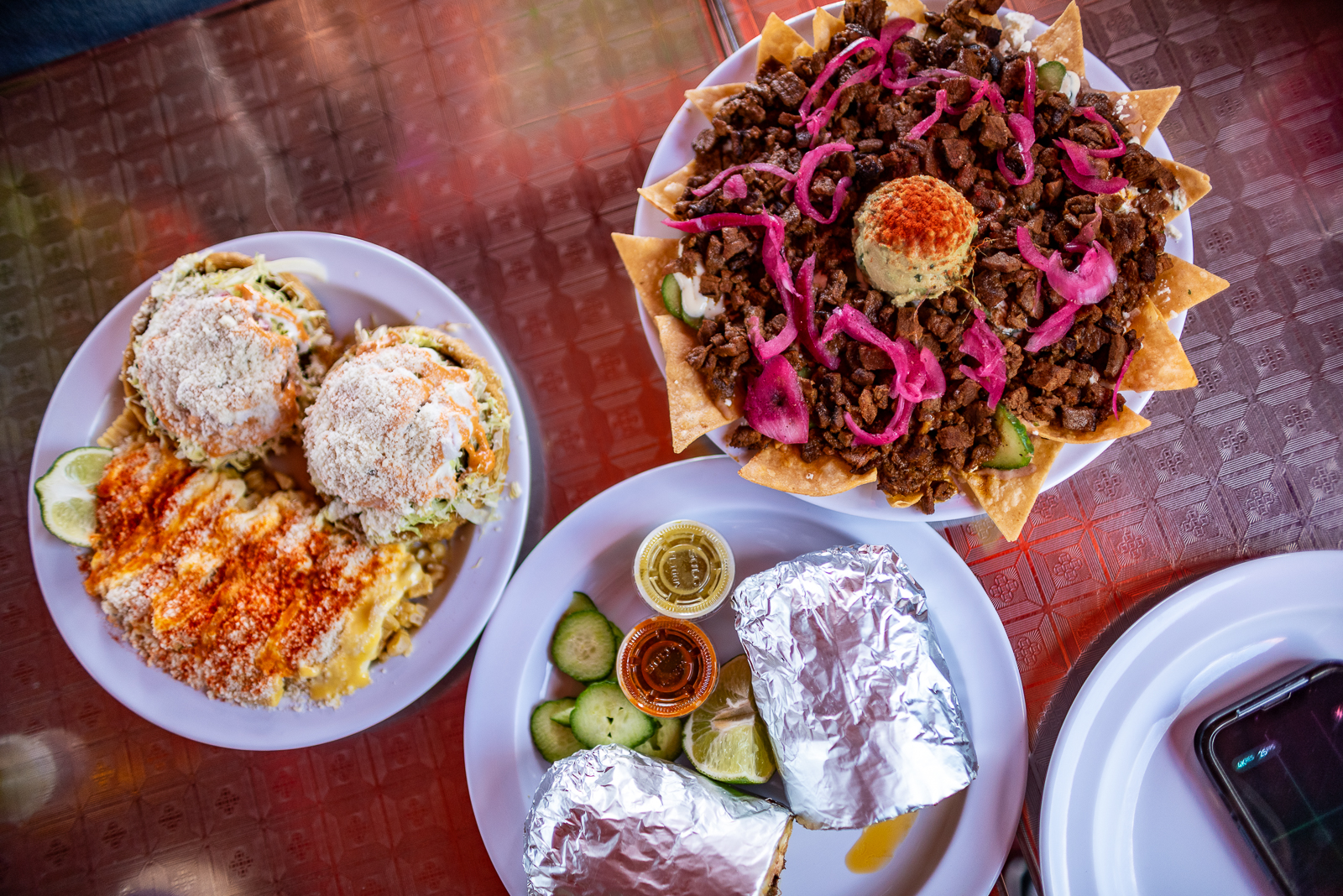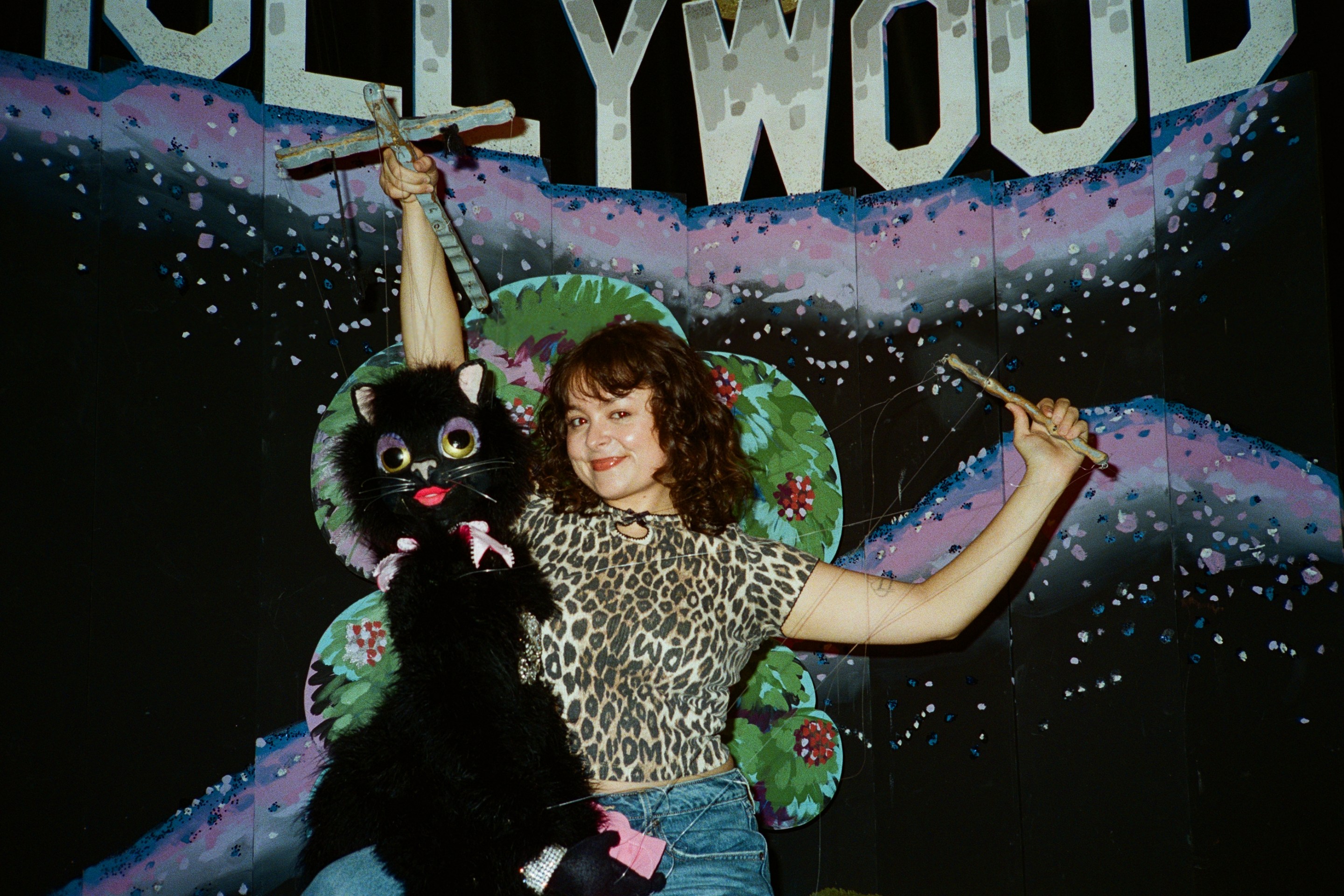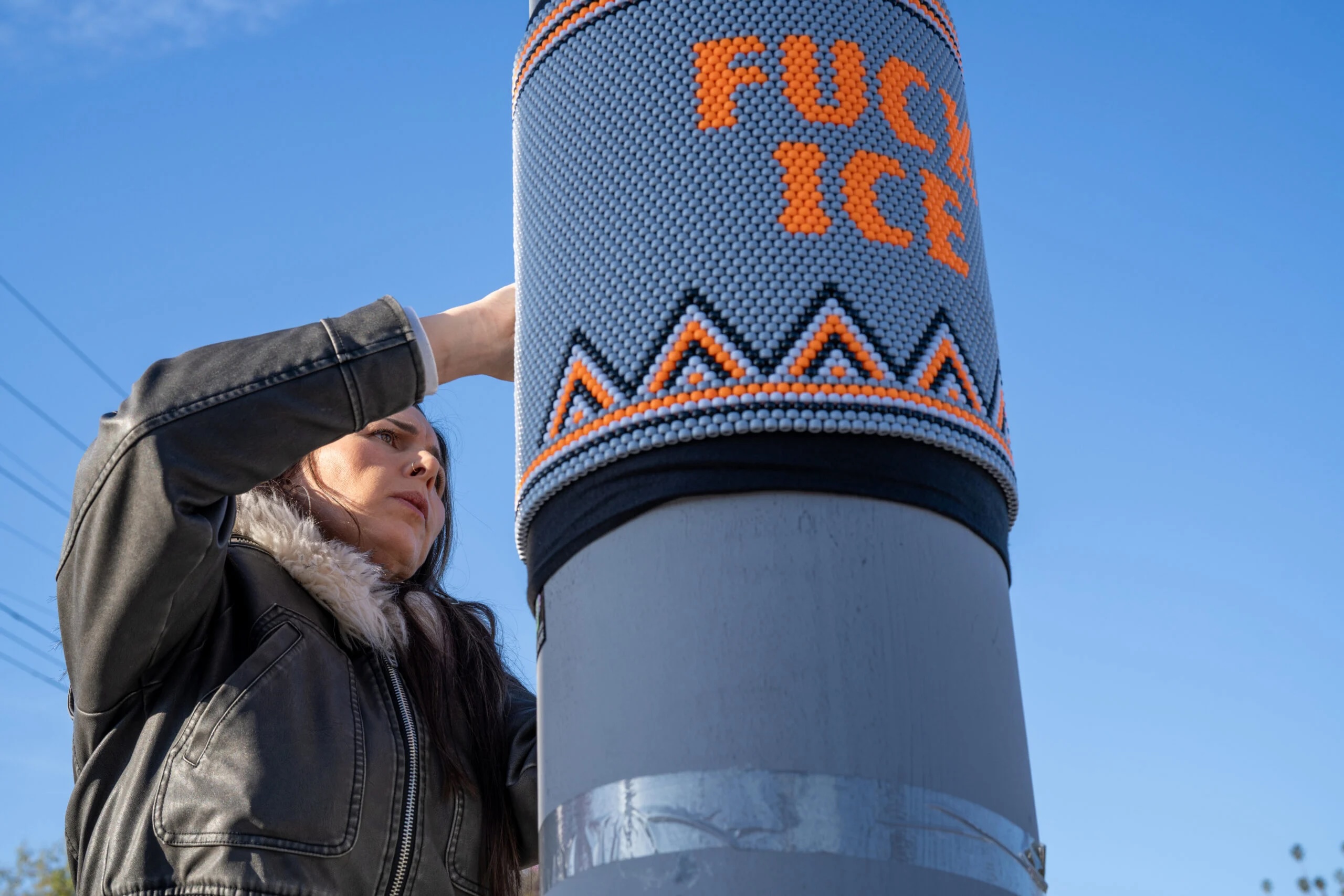From his backyard in East Los Angeles, 31-year-old Daniel Navarro serves what he calls "Comida del Pueblo," which he uses, not just as a saying, but also as the name for his weekend business.
On a recent Saturday morning, Navarro stood behind his griddle, like he does every weekend, ready to serve his traditional Culiacán, Sinaloa-style breakfasts.
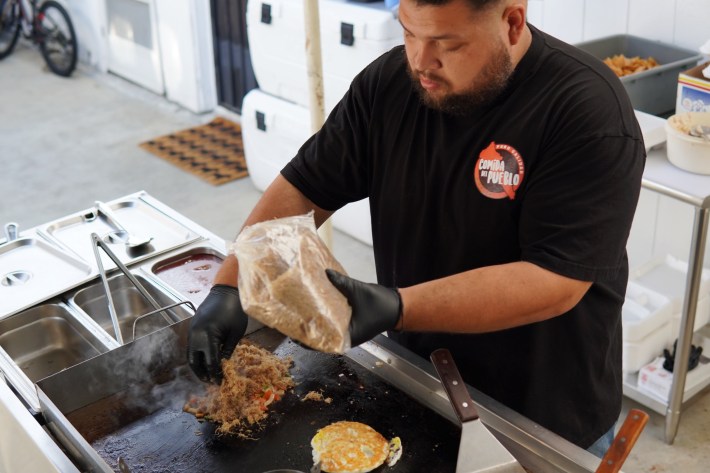
Beside him sat a bag of machaca, one of his most treasured ingredients. It’s like a bag full of precious gold, only stuffed with handfuls of fluffy, re-hydrated beef floss, which he mixes with its signature trio of onion, tomato, and jalapeños.
“People love this," he says. "I sell out of this faster than anything else."
A traditional machaca usually consists of seasoned, dried, then re-hydrated beef that has a jerky-like texture. It gets its name from how it is made. "Machacar," in Spanish, means "to crush," and that’s exactly what is done to the re-hydrated meat: it gets crushed to a gossamer texture.
That morning, his first customers arrived early, patiently waiting for their orders at their tables. Some ordered quesadillas, others the machaca plate, and quite a few came for his other most popular dish: his birriaquiles.
“¿Cebolla y cilantro?” Navarro asks. “Onion and cilantro?”
“Sí,” respond two men, eager to dig into their breakfast.
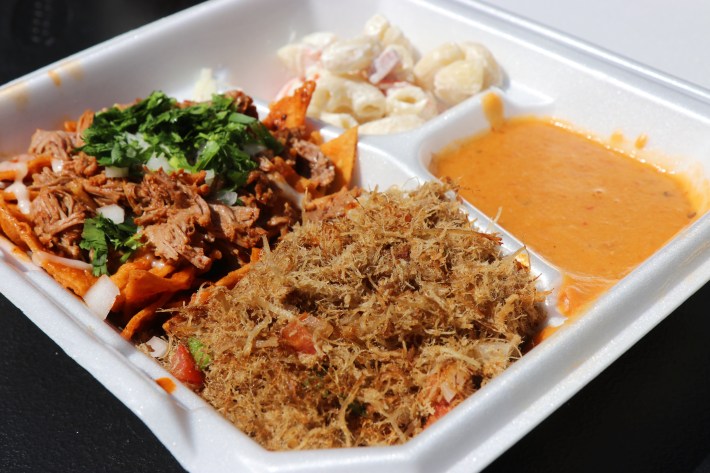
Down the stretch of his driveway that leads into the backyard set-up, Navarro and his team serve up plates by the dozens. The 31-year-old started Comida del Pueblo in September of 2023 and still only sells on weekends. During the week, he works for the City of Los Angeles as a wastewater conveyance worker, a job he’s had for the past eight years.
But he says food has always been something he has enjoyed preparing.
“I've loved cooking since I was little and now I have the support from my family and friends, so it comes easy to me,” said Navarro, placing handmade tortillas on a plate. “I like combining different flavors and bringing something to the neighborhood that maybe they've never tried.”
He loves cooking so much that he originally started as a taquero, doing taquizas under the name Pit Crew Catering. While he enjoys catering events, one of the things he’s always wanted to do is serve a good home-style breakfast like the ones he's enjoyed when visiting Sinaloa.
“My idea was to bring Sinaloense food to East L.A.,” he said. “Just because I go to Sinaloa a lot and it’s something I enjoy eating over there, the frijoles puercos. The tortillas are even different, it's just a different flavor that’s missing here.”

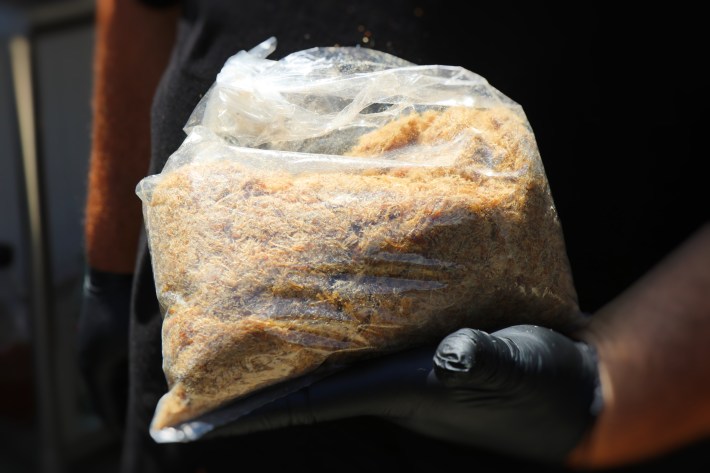
He acknowledges the existence of businesses that sell Sinaloense breakfasts at their restaurants and gives them a nod of respect. However, he feels that the authenticity of the food can often be lost.
“I’m by no means the best, but I know what I bring, and I am trying to make it where you feel like you are at home when you’re here,” he says in the midst of searing some meat.
Navarro prides himself on offering only the best ingredients to his customers, to the point that he has traveled all the way to Culiacán, Sinaloa, to get his sought-after machaca.
Now, he has a friend residing in Sinaloa who ships him machaca. He gets 10 pounds each month, give or take, which he picks up two hours away in Tijuana. His goal is to keep things cost-effective so he won't have to raise prices excessively.
“I sometimes can’t have machaca every weekend, and I feel bad because they come for the machaca, and I have to be like, 'I’m sorry there's no more,'” he says, acknowledging that things don't always arrive on time.
While he usually gets enough to last him two or three weeks max, he usually sells out within the first two weeks.
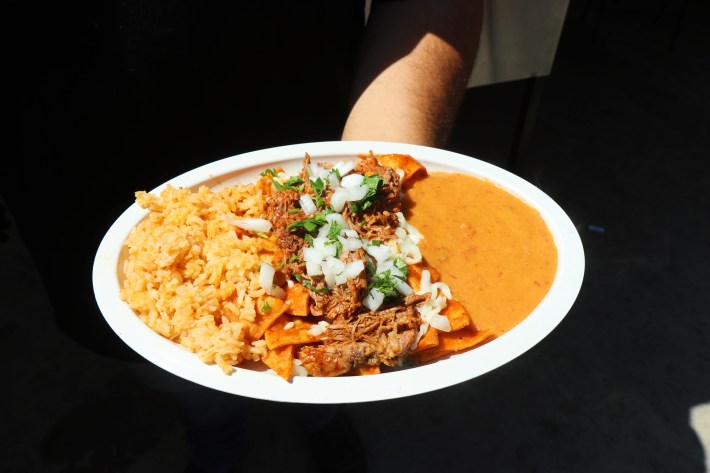
In fact, one of his other most popular dishes only became popular after he sold out of machaca one weekend. With no machaca left to sell, he decided to make his mom's birria de res.
“Cuz I know my mom's birria is good,” he says, joking that everyone, of course, thinks their mom’s birria is good.
The irony is that Navarro avoided cooking birria for a while because he felt like L.A. already had plenty of places serving birria.
“I didn’t want to be known for birria,” he laughs.
He paired that homecooked birria on top of his chilaquiles rojos and named them birriaquiles. They became an instant hit. Now everyone comes for the loaded birriaquiles.
Still, the true star of the show, in our humble opinion, is the machaca, which is not the chewy, tough strands of overcooked meat seem commonly under that name in so many restaurants. It’s smokey, airy, and perfectly seasoned; the taste of the machaca alone is enough to make you feel like you’re eating in Mexico.

The flavor is elevated when adding a side of frijoles puercos, chilaquiles rojos, and a fried, still runny egg on top. You won’t need salsa because the flavors alone are just right, but they do have it if you need a kick. Navarro also serves his plates with a cold macaroni salad and handmade tortillas.
The tortilla chips for his chilaquiles are not store-bought but made fresh every morning, and the chorizo used for his frijoles puercos and other dishes is locally sourced.
Navarro offers the usual array of sodas and beverages to cleanse your palate, but his customers' “go-to” drink is their "Jaz tea," or cold Jasmine tea, also imported from Sinaloa.
Navarro may not be from Sinaloa. Nor are his parents either. Still, he says it’s a place he visits often and is a type of food that he has come to love and connect with. He appreciates the simplicity and richness of a Sinalonse breakfast.
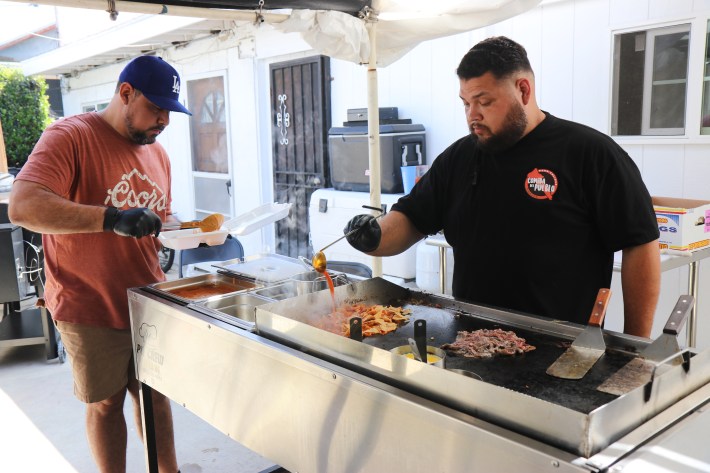
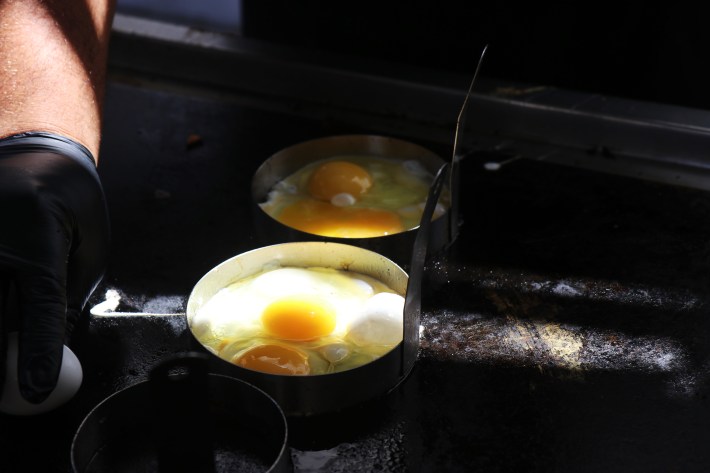
Will Navarro ever move his business from his house into a brick-and-mortar restaurant?
“Of course, but right now, I like it at home because my customers love the attention I give them here,” he says. “They like that they don’t feel the pressure of being in a restaurant and being rushed out.”
The dynamic in his backyard also helps customers feel at home. Usually, Navarro and his crew, which includes his mom on birria and salsa duty, his brother Julian, and his friend's mom and brother, are there on site.
“My co-workers are actually on vacation in Sinaloa, but we’re normally all here talking shit,” he laughs. “Some people might think we’re offending each other, but that's just how we are.”
“Besides that, we all (he and his customers) talk about anything that's going on, and they also give me input on the food and tell me to try adding certain things to the menu,” Navarro says.
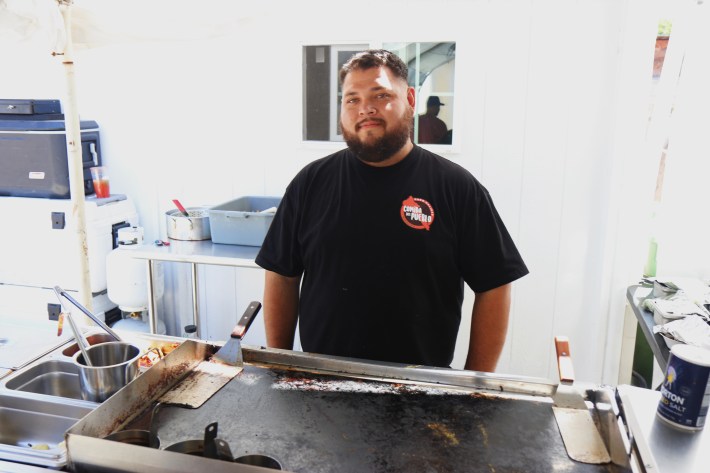
He is currently experimenting with new items on his menu, too.
He serves asientos, which consist of the scraps of the carnitas and its lard served on a tortilla. And if you’re lucky, you can score machaca egg rolls if they haven't been snatched up yet. Coming with a side of their frijoles puercos as a dipping sauce, they always sell out too.
“I usually make a limited amount (25 a day) just because I don’t want to run out of machaca for the bigger breakfast plates,” he says.
Comida del Pueblo's popularity is only growing. He has customers coming from Long Beach, who often buy his crispy egg rolls in bulk. People from the Bay Area, San Jose, and beyond have made their way here for a taste.
“It's been a surprise, the amount of support,” he says. “It happened quickly, and it's great because it keeps me motivated.”
Navarro has regulars that come every weekend solely for huevos con chorizo, a simple meal that you may be able to get anywhere in Los Angeles. Still, his customers say nothing beats sitting down to eat your food and not feeling like you need to rush out.
Navarro plans to expand his menu and is considering a birria McMuffin and barbacoa.
“Honestly, it's just me being fat,” he laughs. “Combining different flavors and making them work.”
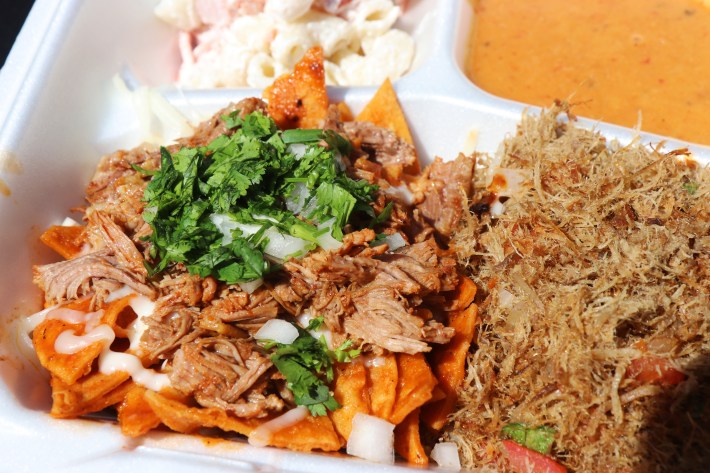
However, everyone asks the million-dollar question: when is a good time to secure their machaca?
Navarro said he can't say, but suggests always showing up early. Still, he can't guarantee that he will have some. Just last weekend, the machaca cupboard was bare, due to his shipment not arriving on time.
The best thing to do is check his Instagram, where he posts everything that will be available each weekend.
Right now, he is developing different recipes to assess what people like before he creates a permanent menu. One thing is certain: his machaca must be a permanent inclusion.
Navarro tries to avoid overwhelming his customers with too many options, so while experimenting with dishes, not all may ultimately go on the menu.
As for what he hopes people think of him and his business, he said:
“I'll let my food do the talking for me.”
Comdia del Pueblo ~ Sat. & Sun. in East L.A.
